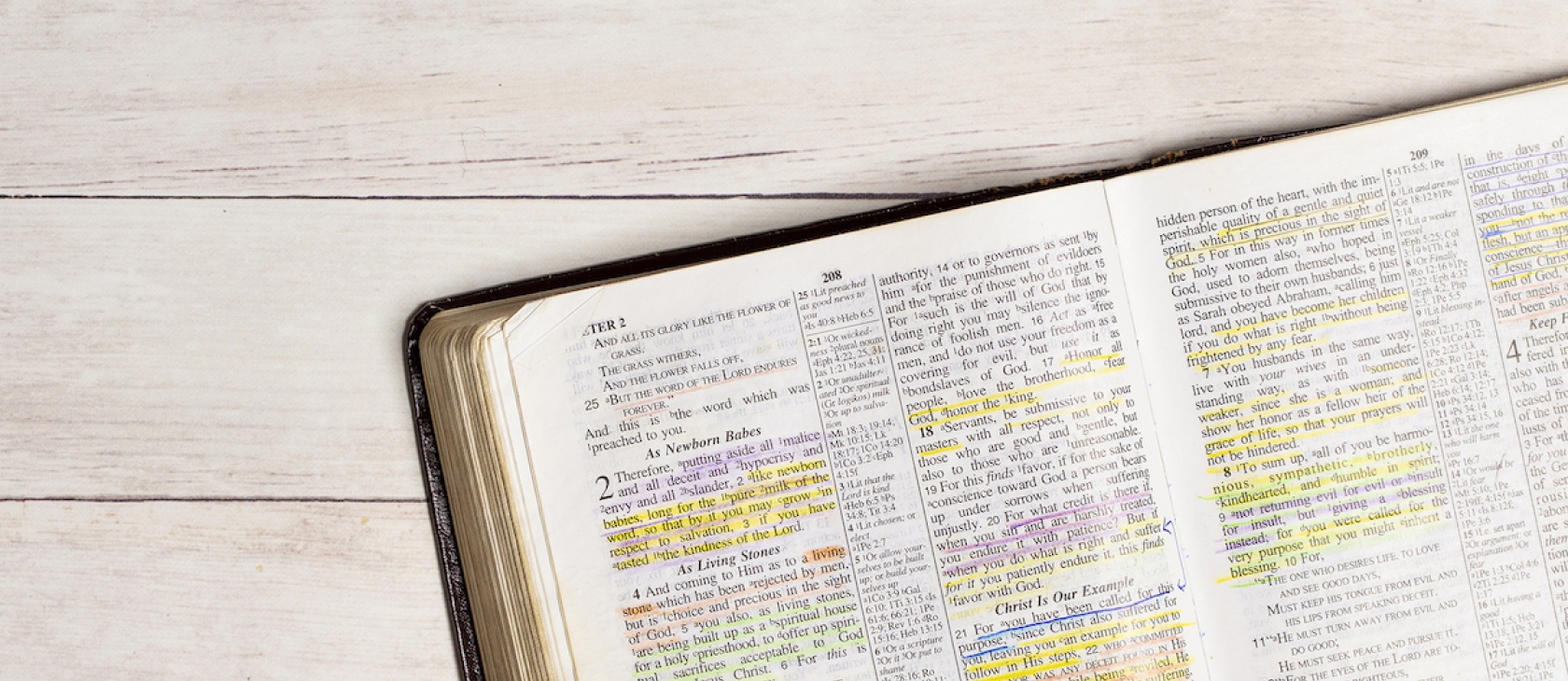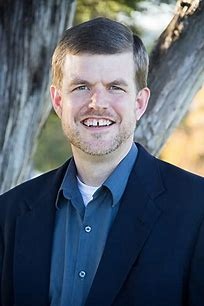Mark A. Noll, professor emeritus of history at the University of Notre Dame, is among the most prolific and accomplished historians of American religion ever. I once imagined that the 2002 book America’s God: From Jonathan Edwards to Abraham Lincoln was Noll’s magnum opus. With the recent appearance of America’s Book: The Rise and Decline of a Bible Civilization, 1794–1911, I am no longer sure whether to view America’s God as a standalone volume or as a sort of companion to America’s Book. In any case, Noll has shown himself capable of extending and even accelerating his scholarly output well into his 70s. Noll has the proverbial fire in his bones; he can’t suppress his desire to understand the complex relationship between Christianity and American history.
Is it possible to build a national identity on a single book? Renowned scholar Mark A. Noll continues his exploration of evangelical Christianity’s singular attachment to Holy Writ and its effect on 19th-century American life, in war and peace.
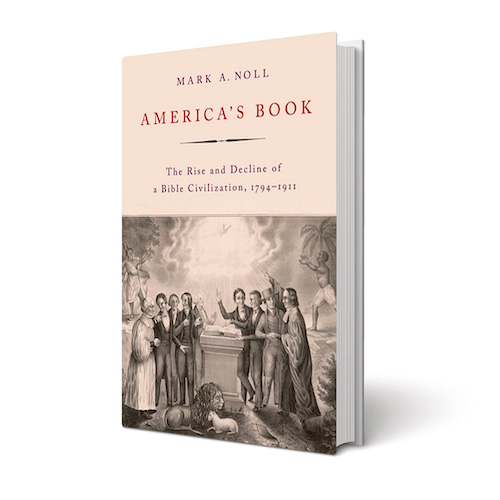
By Mark A. Noll
(Oxford University Press, 2022)
A more recent companion volume in Noll’s vast corpus is In the Beginning Was the Word, his 2015 history of the Bible in colonial and revolutionary America. But that book (comparatively slender at 431 pages, compared to 846 for America’s Book and 622 for America’s God) now seems more like a prelude to America’s Book. In the Beginning explained how the Bible became a distinctly American volume, which readers approached through the lenses of republican ideology and commonsense literalism. Not coincidentally, these intellectual trends profoundly shaped the Revolution, too. America’s God, as its subtitle (“from Edwards to Lincoln”) suggests, covered the same chronological range as In the Beginning and America’s Book. But America’s God was more of an intellectual history of theologians and politicians than America’s Book is. I expected Noll to cover a lot of the same ground in America’s Book as he did in America’s God, and he does so to a certain extent. But America’s Book is more of a social and cultural history of the “rise and decline” of America’s “Bible civilization” than a tracing of elite theologians’ ideas about the Bible and America. Having established the “Christian republicanism” argument of America’s God, Noll examines the on-the-ground fate of that idea in America’s Book. Both books (like all of Noll’s works) fully reward close readings.
Indeed, such readings are essential for anyone needing to establish basic scholarly familiarity with American religious history before World War I. Noll seems to have read and digested virtually every scholarly work on the Bible and religion in the 19th century. He presents a synthesis of that literature in America’s Book, explaining on a grand scale and with considerable ambivalence what it all means. Noll, with characteristic generosity, credits the multitude of authors upon which he draws. For the general reader, this recitation of scholars’ names could make the reading tedious at times, especially given the daunting length of the book. But the blizzard of authors cited and the rich details of the wide-ranging account reflect Noll’s conscientiousness and his passion for the subject. If these qualities don’t make his book “beach reading,” that’s a fault born out of the author’s manifold virtues.
Disestablishment and Voluntarism
America’s Bible civilization, for Noll, was a product of several interlocking theological, ideological, and cultural developments. One was the smooth (if morally and doctrinally problematic) synthesis between American Protestantism and the republican/democratic ideology of the American Revolution. Even non-orthodox figures such as Thomas Jefferson had no problem affirming (as he did in his First Inaugural Address) that America’s “benign religion” was moral ballast for its republican polity. Another component of the Bible civilization, ironically, was the disestablishment of the state churches. Disestablishment made the voluntaristic, Bible-centered religion of the reading believer the norm in America in ways it had not been in the Old World. The turn to voluntarism and Bible-centeredness did not happen automatically or without hard work. It was driven by upstart Protestant denominations, especially Methodists and Baptists, which came to dominate the American religious landscape by the antebellum period.
Even the Northern-dominated old denominations, especially the Congregationalists and Presbyterians, reacted to disestablishment by forging new voluntaristic agencies dedicated to Christian “custodial” influence in American society. Among the most significant agencies, for Noll’s purposes, was the American Bible Society, founded in New York City in 1816. The ABS and many similar organizations did not quite make Bible owning and study as ubiquitous in America as they had hoped. But they did make the individual Bible reader—not just Bible-preaching churches—a foundation of American religion. The Bible civilization was populated by millions of people who had access to the Bible in more immediate ways than perhaps any people ever before.
But what precisely did the Bible do in that civilization? What purposes did it serve? Even in the heyday of Noll’s Bible civilization, the answers were not clear. Many such as Jefferson saw the Bible as a means (hopefully) of inculcating virtues such as love of neighbor. Salvation and personal holiness were not of much interest to such observers. They were mainly concerned about religion’s pragmatic value in a republic, which would collapse if “the people” proved to be craven and selfish.
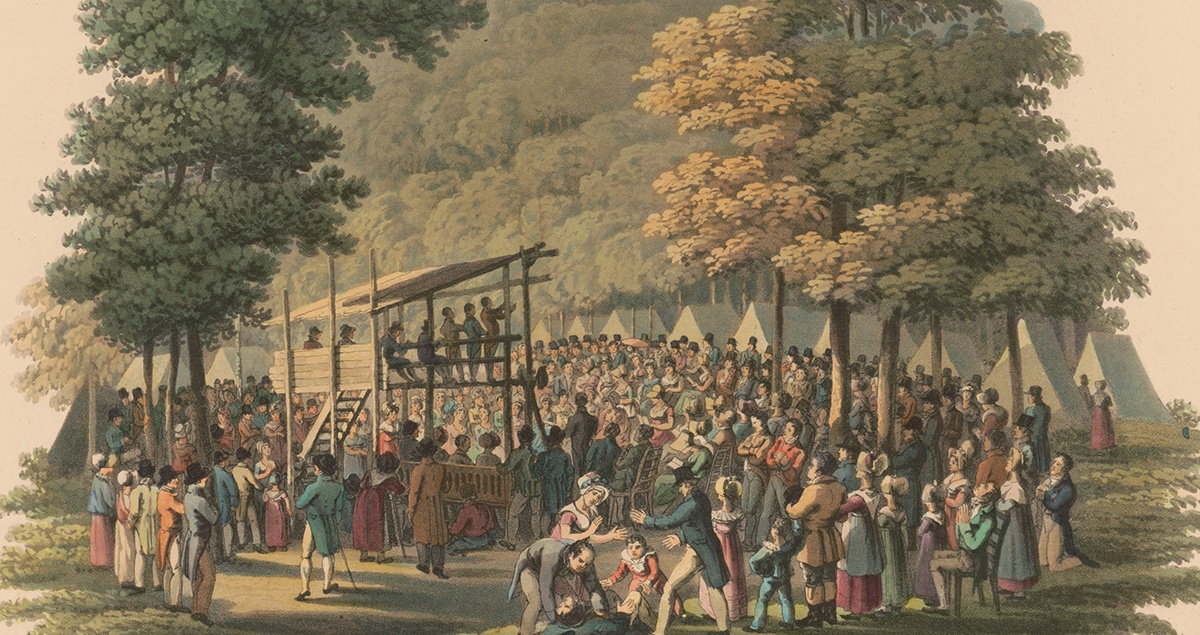
But for the millions of Americans influenced by evangelical religion during the “Second Great Awakening,” salvation and holiness were chief among the reasons for treasuring the Bible. Noll doesn’t regard the Second Great Awakening as an event so much as an extended process in which an unusually high percentage of Protestant Americans, both whites and blacks, came under the influence of evangelical faith. In that faith, Bible preaching and Bible reading were preeminent practices. In the “organizing process” (to use scholar Donald Mathews’ term) of evangelical growth, Methodism was the main event. The Methodists, writes Noll, “were the shock troops who did the most to secure the unquestioned preeminence of Scripture in post-Christendom America.” There’s irony in the Methodist story, too. The Bible civilization was doomed to run aground upon intra-Protestant political disagreements, culminating in the Civil War. But early Methodists were, to Noll, almost entirely apolitical. In other words, politics was going to destroy America’s Bible civilization, but the denomination that most effectively built that civilization was largely indifferent to politics, at least during its time of peak growth.
The Problems of the Apolitical
Noll identifies Nathan Hatch’s 1989 classic The Democratization of American Christianity as one of his most important influences, but Noll’s early Methodists come off as looking far less influenced by American democratic ideology than Hatch’s did. Perhaps this is because Noll assumes that many Methodist leaders (especially by the early 1800s) accepted the ideals of republicanism, despite their lack of engagement in electoral politics. Yet Noll is struck by how Methodists were (charmingly, from a contemporary perspective) oblivious to elections and generally unimpressed by political leaders. My favorite example comes from Francis Asbury, the key figure in the establishing of the Methodist movement in America. Asbury met George Washington in 1789 while in New York City for the Methodists’ state annual conference. In his published journal, which Asbury used to mentor Methodists and publicize their churches, he simply did not mention meeting the new president. Instead, he talked about his sermon at the annual conference (on Isaiah 25:6, “And in this mountain shall the Lord of Hosts make unto all people a feast of fat things”). Can you imagine a pastor or priest today meeting the president and not telling people about it? For Asbury, partisan concerns were subordinated to his spiritual mission.
This spiritualized “Methodistic” bent among rank-and-file evangelicals is missed by many scholars today. Some polemical writers now seem to regard white evangelicals in American history merely as Donald Trump voters in waiting. But Noll, with his typical nuance, realizes that while the temptations of politics are powerful ones, most evangelicals are not evangelicals because of politics. Evangelicals in American history would have generally explained their faith as rooted in God’s gracious offer of salvation through Christ. Salvation and Scripture, furthermore, introduced them to God’s plans for holy living and godly flourishing. At least until the passage of the women’s suffrage amendment in 1920, a strong majority of American evangelicals were not directly involved in partisan politics. Many had opinions about politics or were involved in moral-reform movements with political implications (such as temperance or anti-slavery). But we should look other places besides just partisan politics to comprehend what made the average evangelical an evangelical.
Yet Noll knows that even an apolitical stance can be ethically problematic. (Evangelicals’ critics, of course, are not so much upset with them for being political but for having the wrong politics and associated cultural views.) Being apolitical in the face of the crises over slavery in America was a dereliction of moral duty. Sure, being apolitical was better than being pro-slavery (which many Southern evangelicals were). But touting the “spirituality of the church” as an excuse to check out of politics in the midst of debates over slavery wasn’t a palatable option either (from a modern perspective). It seems that to “stop being political” is not quite the answer to the undue politicization of evangelicals or religious people of other persuasions. Still, Noll ably demonstrates what made early national evangelicals tick when he notes that their faith—particularly Methodists’ faith—was rigorously spiritual, sometimes to the neglect of political concerns.
Arguing Slavery
But politics was on the rise, even for the Methodists. The dissolution of the national Methodist and Baptist denominations over slavery in the mid-1840s signaled the beginning of the end of the American Bible civilization, according to Noll. National schisms and war demonstrated that Protestants’ ironclad confidence in the perspicuity of Scripture had somehow failed in the matter of slavery. If this was the great moral question of the age, why couldn’t Protestants agree what the Bible taught about slavery? Sometimes evangelicals were able to maintain civility in debates over slavery, but more often both pro- and anti-slavery advocates descended to accusing the other side of dishonesty. Noll, following scholars such as Eugene Genovese and Elizabeth Fox-Genovese, once believed that the pro-slavery side actually had the better argument in the proof-texting biblical wars of the antebellum era. Given the literalistic assumptions of most white Bible readers, it was hard to get around verses such as “Slaves obey your masters” (Eph. 6:5, Col. 3:22). But Noll now thinks that even in the context of antebellum Bible culture, the anti-slavery side had the stronger argument. Echoing earlier points in The Civil War as a Theological Crisis (2006), Noll notes that the U.S. was “just about the only place in the entire Christian world” where the pro-slavery biblical argument was found persuasive. The unwillingness to consider one’s faith and biblical interpretations in global historic context fueled white Christian Southerners’ self-deception. In any case, if Americans had agreed on what the Bible taught about slavery, there would have been no Civil War. Instead, Bible readers and preachers only inflamed the national furor, leading to the destruction of the Baptist and Methodist denominations, and ultimately to the nation’s greatest ordeal in secession and war.
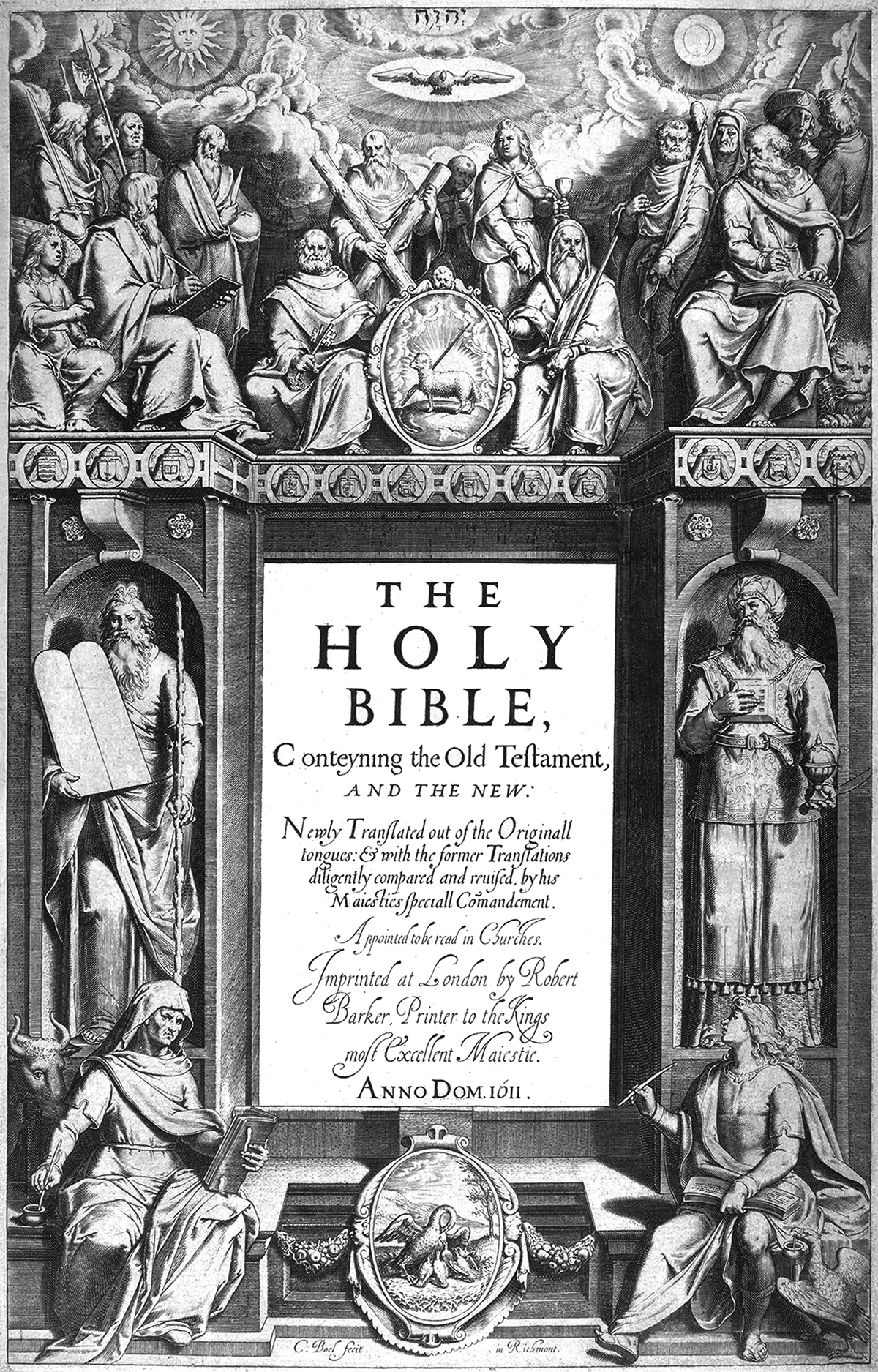
Then, in the mid-to-late-19th century, America saw a massive increase in Catholic and Jewish immigration. Demographically, the nation’s Bible readers were far more diverse in 1900 than they had been in 1850. Catholics, Jews, and different varieties of Protestants took foundationally different approaches to Scripture. Protestants, the historic champions of sola scriptura, revealed the incommensurateness of modernist and fundamentalist readings of the Bible by the time of 1911’s commemorations of the 300th anniversary of the King James Bible.
By the early 20th century, the Bible had taken on a familiar place in broader American culture. The sacred book remained ubiquitous in believers’ personal devotions and in the steady drumbeat of Sunday sermons. It came to the fore in times of national crisis, suffering, or mourning. (More recently, one thinks of President Barack Obama reading the whole of Psalm 46 on the 10th anniversary of the 9/11 attacks.) But the idea of the Bible actually framing public policy, or serving as a basis for American cohesion and virtue, had become mostly a nostalgic dream. That dream retained power mainly for those who looked back on the antebellum Bible civilization and concluded that America was once, and still should be, a Christian nation.



